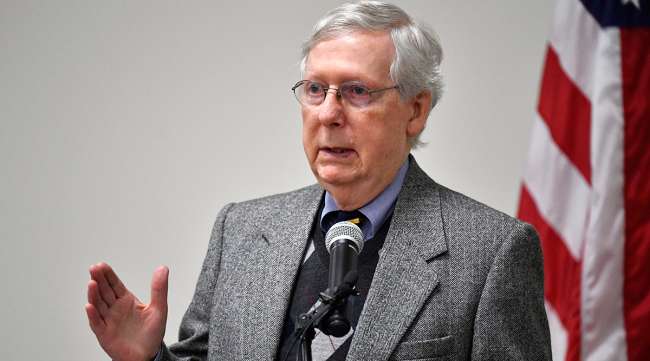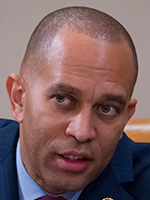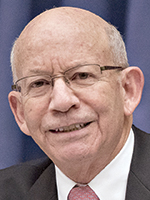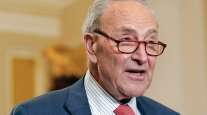Senior Reporter
Impeachment Politics Threaten Legislative Agenda, Key Lawmakers Argue

[Stay on top of transportation news: Get TTNews in your inbox.]
With the impeachment inquiry of President Donald Trump entering a new phase this month, congressional leaders continue to criticize each other over inaction on legislation to keep the federal government funded through fiscal 2020, a new trade agreement and infrastructure policy.
Kentucky Republican Sen. Mitch McConnell, the chamber’s leader, recently blamed the inquiry of the president for the recent legislative inaction on Capitol Hill. And the Democrats point the finger at the GOP-led Senate.
“We all know this is a heated political moment,” McConnell said Dec. 4. “Our country can’t afford for Democrats to obsess over impeachment and obstruct everything else.”
Republicans also emphasize their support for a new trade agreement with Canada and Mexico, and are pressuring Democratic leaders in the U.S. House of Representatives to schedule a vote. The countries signed the new agreement last year.
House Democrats have responded by blaming Republicans in control of the Senate for what they argue has been a lack of urgency on fiscal 2020 appropriation legislation that would include, among other matters, funding for federal transportation agencies. Partisan disagreements over funding for a wall along the southern border has resulted in passage of temporary funding bills to avert a federal shutdown. The most recent short-term funding fix expires Dec. 20.

Jeffries
New York Rep. Hakeem Jeffries (D) defended his caucus’ management of its legislative agenda, noting Democrats have sought to collaborate with Republicans on myriad issues. During an interview Dec. 1 he said: “We’ve actually indicated that we want to work with President Trump to fix our crumbling bridges, roads, tunnels, airports … and to work with him on a renegotiated NAFTA agreement.”
It is undeniable the impeachment inquiry has consumed the energy on Capitol Hill, as each side exhibits passionate arguments. In recent weeks, similar partisan rancor was evident at the typically bipartisan Transportation and Infrastructure Committee, according to key Republicans on that panel.
They shared their concerns with Speaker Nancy Pelosi on Nov. 26, specifically arguing the panel is “becoming distracted by partisan and political battles instead of focusing on what we were sent to Washington to do — work to improve the nation’s infrastructure.” Led by Rep. Sam Graves of Missouri, the panel’s ranking member, Republicans warned that partisan tensions, if unresolved, might threaten progress of a multiyear highway policy bill next year.
Letter to Pelosi by Transport Topics on Scribd
“The T&I committee’s proven road map for success has always been working together to pass bipartisan bills, and committee Republicans remain ready and willing to continue working with our colleagues across the aisle to follow that path,” added Graves and Reps. Rodney Davis of Illinois and Mark Meadows of North Carolina.
The evidence of partisanship for the GOP was a hearing last month in which policymakers considered comprehensive pipeline safety legislation. Procedural requests during the hearing from Republicans were categorized by committee Chairman Peter DeFazio (D-Ore.) as a political stunt that he said wasted the panel’s time. That sentiment by the chairman prompted Davis, ranking member of the influential Highways and Transit Subcommittee, as well as other senior Republicans, to defend their actions.
A few weeks prior to that hearing, Republicans also had criticized DeFazio for holding a hearing that examined Trump’s hotel property in Washington.

Graves
In responding to Graves’ letter to Pelosi, DeFazio said he welcomed infrastructure policy viewpoints from the minority.
“I would remind the ranking member [Graves] that it was a tantrum by President Trump during a meeting with congressional leaders that slowed down bipartisan progress on infrastructure. Despite this setback, the committee continues to work on advancing bipartisan solutions to addressing problems associated with our country’s crumbling infrastructure, and I look forward to receiving the ranking member’s input,” DeFazio said in a statement. “And for those keeping count, more than 90% of the bills considered by this committee have been bipartisan.”

DeFazio
DeFazio insists his team is crafting an update of a 2015 highway policy law, although he has not specified a timeline. A Senate panel with jurisdiction over surface transportation policy already advanced its version. Meanwhile, the White House has not discussed infrastructure policy since negotiations with congressional Democrats on the matter collapsed in May. The president’s private sector-centric infrastructure plan unveiled last year failed to win support on Capitol Hill.
Transportation expert Jeff Davis, senior fellow at the Eno Center for Transportation, said stakeholders are eagerly awaiting the White House’s next move on highway policy since funding authority for highway programs expires in September. As he said during a recent interview, “We’re hopeful to see some really substantive proposals from the administration on how to do the next five or six years of highway and transit funding.”
Want more news? Listen to today's daily briefing:




